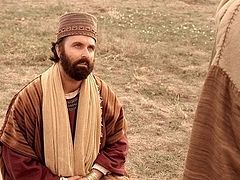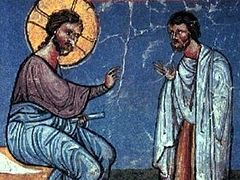St. Luke 18: 18-27
Epistle to the Galatians 3:23-4:5
In order for me to remember to do much of anything, I usually have to write it down on a list. If it’s not on the list, it usually doesn’t get done, and some tasks remain on the list for a very long time before I finally get around to them. Maybe some of you are like that also.
The rich young ruler who asked Jesus Christ what he had to do in order to find eternal life also apparently thought in terms of lists. So when the Lord told him to keep the commandments of the Old Testament, the man said that he had checked them all off, that he had kept them his entire life.
This is where the story gets really interesting, for the Lord then gives him a commandment that had never been on the man’s list and that he couldn’t imagine following: Sell all that you have, give to the poor, and come follow me. This fellow was rich and powerful and loved his possessions, so he became very sad and apparently walked away. The Lord knew how hard it was for people who have it all in this life to enter the kingdom of heaven, for they are tempted strongly to love their possessions and status more than God and neighbor. Still, as the Lord said His stunned disciples, “the things which are impossible with men are possible with God.”
What did Christ mean by speaking in this way? He certainly wasn’t simply adding another law to a list of requirements to be checked off. Instead, he challenged this man to stop thinking about his relationship with God as a matter of law, a set of behaviors, which he could master. Someone who responds to the Old Testament laws by saying, “Oh, I’ve always followed them since I was a child” has a very shallow understanding of what God requires of us. That would be like someone saying, “Oh, I’ve always been a perfectly faithful Christian since childhood.”
The problem is that it’s not quite that simple. In the Sermon on the Mount, Christ showed us the true meaning of God’s requirements. He said that we are guilty of murder if we are angry with others, if we hate and insult them. He taught that we are guilty of adultery if we lust in our hearts. And if we do not love God with every ounce of our being and our neighbors as ourselves, we have broken the greatest of the commandments.
If we have any spiritual insight at all, we will see that none of us has mastered God’s requirements, none of us may stand before the Lord bragging that we have it all down. The truth is that we have all fallen short and need God’s mercy and healing in our lives.
Christ jolted this man out of his delusion, of his false self-confidence, by giving him a commandment that He knew he could not keep: giving away all his beloved money, possessions, and power. Perhaps for the first time, this fellow was challenged to see that eternal life is not a matter of checking off a list, not something that we can accomplish by our own ability. If we can’t give up that which we love most in this life for God, then we obviously have not fulfilled all that the Lord expects of us.
And since Christ came to unite our fallen humanity with divinity and to conquer sin and death, it’s pretty clear that even the most law-abiding person still needs the mercy, grace, and love of our Lord in order to inherit eternal life. By our own power, it’s not possible to share in the life of heaven, but with Jesus Christ, all things are possible.
As we continue to prepare for the coming of Christ at Christmas, we do well to remember that this great feast is not about the birth of a mere teacher, law-giver, or example. Were our Lord simply another prophet with a strict teaching, we would not rejoice at His coming. Instead, we would—like the rich young ruler—become sad and dejected, for the last thing we need is another law to fail to obey and make us feel guilty.
The eternal Son of God was not born at Christmas to add to the burden of the law or to give us the impression that all will be well if we obey a new set of teachings. To the contrary, He became a human being to do what a mere law never could, to bring us into His holiness, to make us partakers of the divine nature, to heal and fulfill our fallen, corrupt humanity, to make it possible for us mortals to put on immortality.
The Lord’s shocking statement about giving everything away challenged the rich young ruler to stop thinking of his life before God in legalistic terms. Likewise, we should use the prayer, fasting, almsgiving, and other spiritual disciplines of the Nativity Fast, of Advent, to be shocked out of our conventional and shallow assumptions about what it means to share in the eternal life of the Holy Trinity. For Christ was not born to bring us self-indulgence, popularity, or whatever else the world calls success. Neither did He come to make us strict legalists who think that holiness can be reduced to a list of “do’s” and “don’ts.” And He certainly did not put on flesh in order to make His followers the self-righteous judges of others.
The eternal Son of God became one of us for completely different reasons. Out of unfathomable love, He wanted to make possible for us what is impossible by our own power. We may take pride in what we accomplish, but which of us can claim credit for our Lord’s birth? There is no earthly prestige in a Virgin Mother giving birth in a cave to a baby who whose cradle was a manger, a feeding trough for animals. The rich young rulers of the world cannot understand a Messiah whose human life begins in such lowly circumstances and ended on a cross. Jesus Christ’s birth, life, death, resurrection, and ascension are not simple human accomplishments or rewards, but truly miraculous manifestations of God’s eternal life in our world of sin, death, and corruption.
St. Paul reminded the Galatians that the Old Testament law was preparatory to the coming of the Savior. All who put on Christ in baptism are God’s sons and daughters who inherit the promise made to Abraham to bless those with faith in the Lord. We are slaves neither to a law nor to the ways of the world, but beloved children of our Heavenly Father Who wants nothing more than to bring us into the glory of His eternal life.
A religion that simply provides more laws to obey, or a culture that piles on burdensome expectations, could never do that. They simply make things worse by giving people more opportunities to judge themselves and others. For it’s when we are ashamed of not measuring up that we are most likely to shift our attention to putting down other people in order to make ourselves feel better.
The God-Man Jesus Christ operates in a completely different way, of course, making it possible for everyone, no matter their struggles or failures or social standing, to find true peace through faith, humility, and growth in holiness--In other words, through our ongoing acceptance of His mercy and healing in our lives.
We prepare to receive Christ at Christmas by opening our hearts and souls to His salvation—not by mastering laws—but by true repentance. Both in our private prayers and in the sacrament of Confession which we should all take during Advent, we repent by honestly confessing our sins and asking for the Lord’s mercy, even as we resolve to make a new beginning in the Christian life. Yes, we must cooperate with our Lord’s mercy and grace by doing what we can to live faithfully. But even the best life does not somehow earn heaven. In fact, the more we grow in holiness, the more we will begin to see clearly the gravity of our sins and how far we are from the full stature of Christ. The closer we grow to Him, the less we will think of salvation as a reward for good behavior according to a check list.
So let this Advent be marked by humility, repentance, and spiritual disciplines for us all, not because we have broken a law, but because we have room to grow in our relationship with Jesus Christ. Our hearts and souls are not worthy of Him. We do not serve Him in every poor and suffering person. We do not seek first His kingdom and righteousness. We are not perfect as our Father in Heaven is perfect. But unlike the rich young ruler, we must not give up and walk away in despair. Instead, we should say, “Lord, Jesus Christ, Son of God, have mercy on me, a sinner.” For what is impossible with men is possible with the incarnation of the God-Man Jesus Christ. He is not a law, but a Person.





